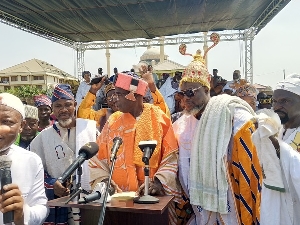 The Chamba people are celebrating a milestone in their chieftaincy
The Chamba people are celebrating a milestone in their chieftaincy
The Chamba Community in Ghana has marked its 80th anniversary of chieftaincy in Ghana at a well-organized occasion in Accra.
The occasion was showcased with a rich tapestry of the Chamba cultural heritage aimed at coming together to celebrate the eight decades of tradition, resilience, and unity of the Chamba people.
The Chamba chieftaincy has been a beacon of leadership and progress within their communities, and the celebration of the anniversary provides them with a unique opportunity to reflect on their past achievements and to envision a future filled with hope, prosperity, and opportunity for all.
Chambas in Ghana are known for their hard work and business acumen which has contributed significantly to the socio-economic development of the country.
The Chambas women are the majority of chop bar owners at Nima, Mokola Market, Okineshie and other regions in Ghana.
The Chief Executive Officer of Ayawaso East Municipal Assembly, Hajia Salma Muhammed Sani Kuta, stated that the Chamba ethnic group have contributed to national development and used the occasion to pay tribute to the generations of leaders, elders, and ancestors who have guided them.
She said the wisdom, courage, and resilience of their leadership continue to inspire them as they strive to build a better future for themselves and for generations to come.
She revealed that the theme of the occasion, "Chamba Ethnic Group: An Asset to National Development," speaks to the heart of the Chamba people's mission as a community and it underscores their commitment to leveraging the unique cultural identity and heritage of Chamba people as a catalyst for positive change and progress within the society.
She urged the Chamba people to recommit themselves to the values of unity, inclusivity and mutual respect that have always been at the core of their community and come together to honour their past as well as to embrace their future.
On his part, the Chamba Chief of Ghana, Sarki Zakaria Tahiru Kuta, also known as Dockson De'naa, said that the Chamba is an ethnic group in northern Ghana and their language is known as Chamba.
He said Chamba culture and identity is the same wherever they find themselves in the world due to the history of slavery across the borders of Togo, Nigeria, Cameroon and other neighbouring countries.
According to him, Chambas re-grouped and cohabitated with other ethnic groups adding that the Chambas have lived in the Greater Accra Region for close to three centuries hence the need to celebrate its 80th anniversary of chieftaincy.